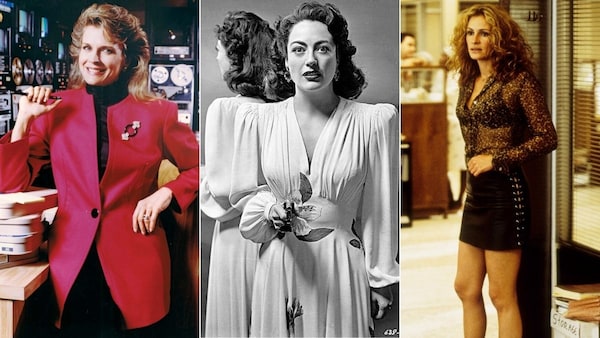Murphy Brown to Erin Brokovich, examining how Hollywood has depicted single mothers in films and TV
From misogynistic portrayals of single mothers as inept caregivers to imbuing them with agency, Hollywood has come a long way in the way it characterises single mothers. Here’s taking a look at the prominent single mother figures on-screen.

Last Updated: 08.31 PM, Sep 23, 2021
Cinema has always depicted maternal figures in myriad shades. While most follow the formulaic protective, loving figure, some are laced with more complex undertones. But be that as it may, the character of single mothers has always had a special place in our hearts.
The role of the single mother has especially taken centre stage in Hollywood and rightfully so. They were prominent characters from the era of silent films. The only difference is that their characterisations usually ranged from socially deviant to ones responsible for their kids going astray. Their place was generally off-centre in society, one where they could not be accepted as the primary caregiver, mostly because they also took up the paternal role. They did ‘manly’ things, worked hours, had agency, and exercised it too; and as a direct result, were the devil incarnate.
Over the years, the depictions changed and became more of a positive tour de force. The beginning of the millennium also witnessed a marked shift in the way single mums were flooding the screen. In fact, in 2001, three of the five nominated actresses for the Oscars played single mothers in their films. These mums were tigresses, vehemently guarding their kin against the “bad, bad world” outside; and challenging any and every person who dared to question their abilities. But more modern renditions choose to depict the figures in a more realistic light. One where they’re just humans above and before being caregivers.
The earliest portrayal of the single mother figure that garnered considerable importance was Mildred Pierce (Joan Crawford) in Mildred Pierce (1945). Based on James M Cain’s book eponymously titled on the main character, the main crux of the plot was revolutionary on its own. Studies showed that only 3.8% of births were attributed to unmarried women. Hence, being a single mother at the time was already a reason for complete ostracization. That the film chose to depict it, was a step further. Crawford created quite a buzz with her role in the film. Mildred’s journey begins after she bears children out of wedlock. A husband’s absence forces her to enter into the restaurant business. Initially hesitant since she did not possess any knowledge of working, Mildred gradually begins learning the ropes of the profession. Days go by working hard and gradually, her children grow up. But almost as an ironical trope, her eldest daughter Veda (Ann Blyth), transforms into an extremely selfish brat, thrusting Mildred into further worry that she was never enough of a guiding figure.
When The Terminator released in 1984, the audience gushed over the uber-macho humanoid (Arnold Schwarzenegger) who was the proverbial “saviour of man.” But what many did not notice is how Sarah Connor (Linda Hamilton) entered the scene and changed the prescribed ideologies of the single mum figure. Astute and no-nonsense, Sarah was a fighter, a killer who could take necessary steps to save her child. She was the new mother figure, a progenitor and creator of a race of combat soldiers, who fought for humanity. The same figure was further developed in the Sarah Connor Chronicles (2008) where her role was taken up by Game of Thrones’ Lena Heady. While Hamilton had to portray the character within the time constraints of a film set up, Heady took a more liberal approach with it and presented a poignant and nuanced version of Sarah.
1992’s Murphy Brown series effectively turned the single mother figure on its head and forced the world to stop and take notice. The 10-season series consolidated Brown (played by Candice Bergen) as a no-nonsense toughie. Her character was all about the real and seldom did she slip into sappy emotions to prove her affections or love for her child. In a famous dialogue from the series, Murphy looks at her child and vocally drafts an apology of sorts. "I'm not going to be like other mothers. I don't cook or sew or make stuffed animals talk in funny voices. But I promise that you won't have to wait until after the cake to open your birthday present," she says. Murphy’s ballsy move of giving birth to son (while being unhitched to any man) was hailed blasphemous by then-American Vice President Dan Quayle. Bergen’s Murphy Brown was quick to hit back and in the following episode she famously said, “Whether by choice or circumstance, families come in all shapes and sizes, and ultimately what really defines a family is commitment, caring and love.”
Both as a cultural icon and a television figure, Murphy established that mothers could be cut-throat, ubiquitous, demanding, and willing to bend the rules.
Miranda Hobbes (Cynthia Nixon) from Sex and the City (1998-2004) is a similar mother figure. A busy lawyer, living in the Big Apple, she is all about ambition and a drive to reach higher in life. She understands pretty early in her life that she won’t compromise on things she has worked hard towards. Thus, when she faces an unplanned pregnancy with her former love, Steve (David Eigenberg), she takes up the challenge to parent the child with aplomb. She stumbles and falls in her journey as a new mom, but always comes back up with renewed vigour (but not after a good cry and some chilled red wine).
Arguably the feistiest of this lot, Julia Roberts’ Erin Brokovich was a hallmark of badass single mums. Based on true events, Roberts artfully stepped into the shoes of the blonde-haired, incessantly-smoking, skimpily clad Erin, an opinionated legal researcher who uncovers a mammoth sham that the Pacific Gas and Electric Company were trying to mask from the people of Hinkley, California. Shunned initially for her apparent-bimbo exterior, Erin soon unearthed documents revealing how the company’s irresponsible methods were leading to cancer amid multiple citizens of the area.
Another unforgettable single mother icon is Jane Villanueva (Gina Rodriguez) in Jane the Virgin (2014-2018). Much to her consternation, when Jane finds out about her pregnancy, she is devastated. But after a quick turnaround, she decides to have the baby and continue with her upbeat life. A perfect blend of vivacious and resourceful, Jane remains unperturbed even after giving birth. Armed with a platoon of strong women including her mother Xiomara (Andrea Navedo) and grandmother Alba (Ivonne Coll), she gears up to raise her son and instil the correct values in him.
Each year brings in new characters with more and more interesting layers to it. Defining the mother figure may be entirely difficult at this juncture but that very fact makes it even more alluring. With more off-beat portrayals like Mama (2013) or even, I am Mother (2019), the conversation has further been pushed into spaces that are very difficult to box. The ambiguity of characters in such films then become social markers that ensure mothers don’t have any particular role to fulfil on or off-screen.

 Premium
Premium